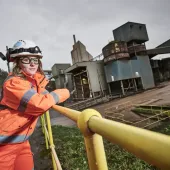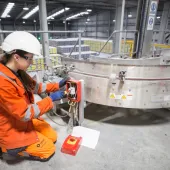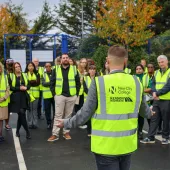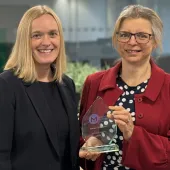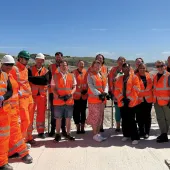Programmed for Progress
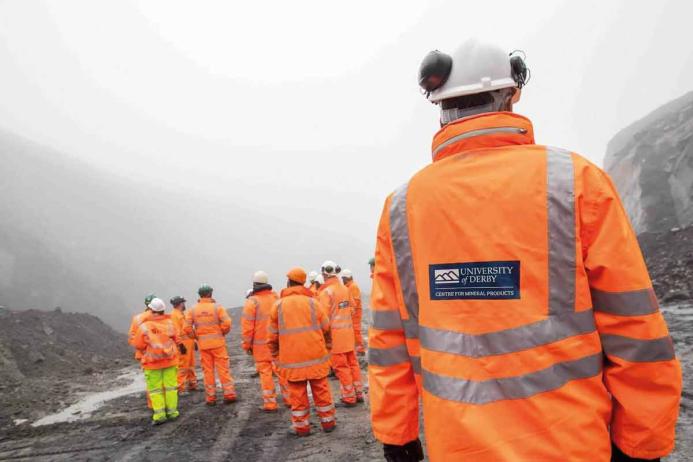
First published in the August 2025 issue of Quarry Management
Centre for Mineral Products at The University of Derby
Since 2007, the Centre for Mineral Products (C4MP) has successfully collaborated with the mineral products industry to create relevant higher education programmes, suited to five specific areas of the sector, combining contemporary learning with flexible delivery for the benefit of individuals and businesses alike.
As a key partner of the Institute of Quarrying, C4MP develops programmes in partnership with key industry bodies, such as the Institute of Quarrying, The Institute of Asphalt Technology, The Concrete Society, and The Heavy Clay Association, designed to meet industry needs across the areas of mineral extraction, asphalt, concrete, clay, and cement.
Each programme is built to align with rigorous academic standards and real-world industry needs, ensuring that learners develop the knowledge, skills, and professional behaviours essential for success in the sector.
‘Our programmes and our delivery are about effectiveness, efficiency, and competency, founded on the skills the sector needs. Everything that they are doing, they’re applying and relating to the workplace,’ said Mark Osbaldeston, head of the Centre for Mineral Products.
Based at the Enterprise Centre in Derby, each year around 400 learners engage with C4MP across all programmes, including Honours and Foundation Degrees, Higher Apprenticeships, Diplomas, and Certificates. The programmes are structured across different qualification levels and tailored for various career stages, from new entrants to experienced professionals looking to upskill or specialize.
‘We understand that our learners are working people, which is why it is essential that we offer flexibility and accessibility of programmes, integration of industry-specific modules and the importance of practical experience, ensuring that the curriculum aligns with the needs of both learners and employers,’ added Mr Osbaldeston.
Valuable objectives and benefits
As working professionals, learners are not accommodated on site and, therefore, commit to their education in addition to their working days, with their employers working alongside C4MP to accommodate their extra workload.
The programmes aim to develop learners in several areas:
Technical knowledge, eg mineral extraction and processing, asphalt and concrete technology, and mechanical and electrical engineering
Leadership and managerial knowledge, eg project management, commercial management, and health, safety and environmental management
Soft skills, eg communications
Future-focused skills and knowledge, eg decarbonization, sustainability, and the circular economy.
Each learner is given a study programme at the start of the year, with learning materials released in manageable, bite-sized chunks. Then learners address any challenges with the learning materials by consulting with their tutors.
Several benefits ensue:
Delivery of a flexible format for working professionals
On-the-job projects enhance real-world application
Recognition by the professional institutes
A clearer pathway to supervisory or managerial roles.
Structured learning programmes
A comprehensive suite of learning materials is the most critical component of the programmes. Industry-specific content is owned by the institutes with all generic content owned by C4MP. Learners’ understanding of this content is underpinned by continuous assessments. Content is founded on the needs of both employers and learners. For example, content may focus on industry issues such as sustainability or zero carbon, but underpins these issues with real-world application, such as mineral extractives technology or asphalt technology.
Learners (other than apprentices) can successfully complete the programme remotely, provided they have access to the online resources, but most learners choose to attend face-to-face sessions.
‘We have consciously designed the programmes to overlap the competency content, to create consistency on the key principles applicable to the sector, but also critically to do a deeper dive into each of the five areas of specialism,’ said Mr Osbaldeston.
As part of the educational framework, this same competency content is used across different learner groups, including Foundation Degrees, Apprenticeships, and Diplomas. The depth of the detail for each group will vary based on their experience within the sector and their specialty. Typically, for instance, apprentices, whilst new to the business, may be further on academically having possibly gained GCSE Maths and English, compared with some of the Foundation Degree candidates, who will study maths and engineering. Diploma students are typically further on in their career, or they are a graduate.
The continuous process of assessments learners undertake to consistently review learning, has the option of face-to-face workshop sessions to embed the knowledge, however face-to-face workshops are compulsory for all apprenticeship learners.
‘The delivery model is an interesting one because it is not categorized as anything, because it drops into so many different brackets – it’s work-based, it’s distance learning, it’s blended, it’s online,’ added Mr Osbaldeston.
How the programmes interconnect
All qualifications share a modular structure, with relevant overlap between some of them:
Foundation Degrees carry the highest level of content. Apprenticeships and diplomas share and reuse relevant and specialist modules from the foundation degrees.
BSc Top-Ups: Build directly on credits from Foundation Degrees or Apprenticeships.
Certificates: Provide entry points or standalone knowledge enhancement.
‘C4MP delivers a suite of interconnected programmes over five subject areas. The qualifications, delivered by experienced industry professionals, enable those employed nationally and internationally to enhance their career, lifelong learning, and to drive the sector forwards,’ said Sandy Sykes, executive director of the Institute of Asphalt Technology.
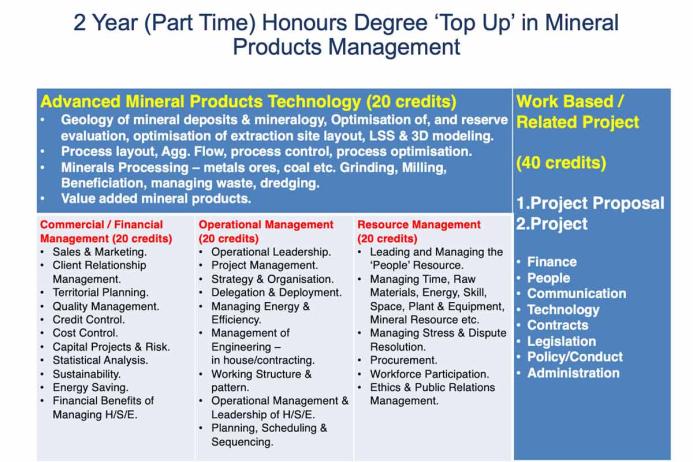
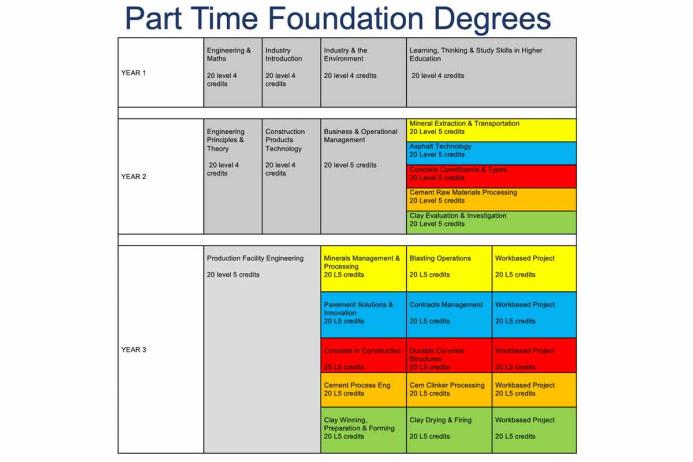
BSc (Hons) in Minerals Management – Level 6
This is a top-up honours degree for those who have completed:
A Foundation Degree, or
The Higher Apprenticeship programme, or
Any other relevant prior qualification.
Programme Structure:
Credits: 120 credits at Level 6
Modules: 4 x 20-credit modules and 1 x double module (work-based project, 40 credits)
Outcome: Full BSc (Hons) degree.
This qualification completes the academic journey and may support progression to Chartered status (CEng, CEnv).
Foundation Degrees (FDs) Level 4 & 5
There are five distinct Foundation Degrees, each aligned to a specific area of the mineral products sector:
Mineral Extractives Technology
Asphalt and Pavement Technology
Concrete Technology
Clay Technology
Cement Technology.
All learners begin with the same foundational modules, ensuring consistency and cross-sector understanding before moving into specialist content. The choice of pathway is often determined by the learner’s job role or employer’s preference. FDs are designed for those already working in the sector who are progressing into supervisory or management roles.
Structure:
Typically completed over three years, although a two-year route is possible for learners with prior learning.
Comprises 240 credits – Level 4 (Year 1 & 2): 120 credits, and Level 5 (Year 2 & 3): 120 credits
Modules: 12 modules (each worth 20 credits). Around 75% of the content is shared across all FDs, with three industry-specific modules tailored to each pathway, ie 9 core modules common across all five FDs, and three specialist modules per FD, tailored to the subject area
Includes a work-based project.
Higher Apprenticeship – Mineral Products Technician
The apprenticeship is about acquiring new knowledge, skills, and behaviours. So, on one hand this programme is open to people who are already in the sector, but more so, the programme functions as an ideal route for younger people to enter the industry.
The Higher Apprenticeship can be used for high-achieving, sixth-form tertiary course leavers, to develop employee’s knowledge of the industry-specific context in which they operate.
Structure:
A Level 4/5 programme with five specialist pathways (same as FDs).
Integrates academic modules with industry-recognised vocational qualifications (eg SHE4 – Safety, Health, and Environmental qualification)
Delivered over approximately 2.5 years
Includes a work-based project as part of the end-point assessment which contributes to academic credit
Provides equivalency to 240 credits, allowing progression to the honour’s degree.
University Diplomas – Level 5
One-year programmes built from the industry-specific modules of the Foundation Degrees. They are focused programmes for graduates already in the sector or new to it, consultants and suppliers to the sector, and supervisors who might be settled within their role but who need to contribute to continuous professional development.
Diplomas are available in the same five areas:
Mineral Extractive Studies
Asphalt Studies
Concrete Studies
Clay Studies
Cement Studies.
Structure:
Typically comprises three technical modules plus optional modules, Business Management, or a work-based project.
Duration: 1 academic year
Credits: 60 credits (3 specialist modules).
Diplomas reuse the specialist content from the FDs, making them ideal for graduate-level upskilling, lateral movement across the sector, or further specialization and for those looking to progress to senior management or technical leadership positions within the industry.
Certificate Programmes – Level 4
Typically, shorter, focused, entry Level 4 qualifications aimed at early-career professionals or individuals working in support roles (eg, sales, admin).
Examples:
Certificate in Construction Materials Technology (20 credits)
Certificate in Ready-Mixed Concrete Technology (20 credits)
University Certificate in Concrete Technology, delivered in partnership with the Concrete Society (60 credits).
Structure:
Flexible online learning with optional face-to-face sessions
Ideal for upskilling or foundational knowledge
Can serve as a stepping stone to higher qualifications.
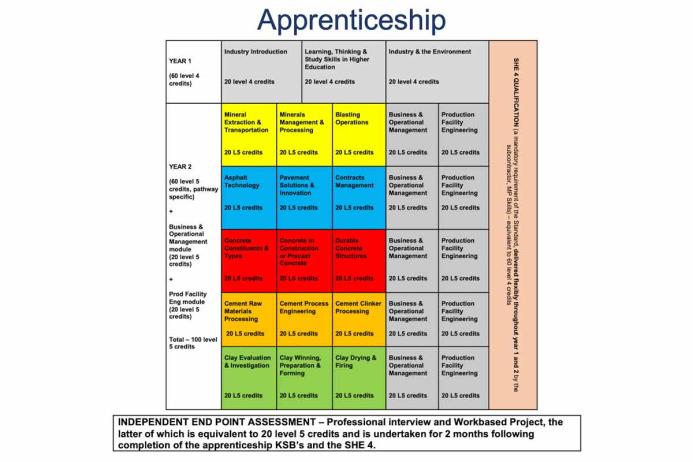
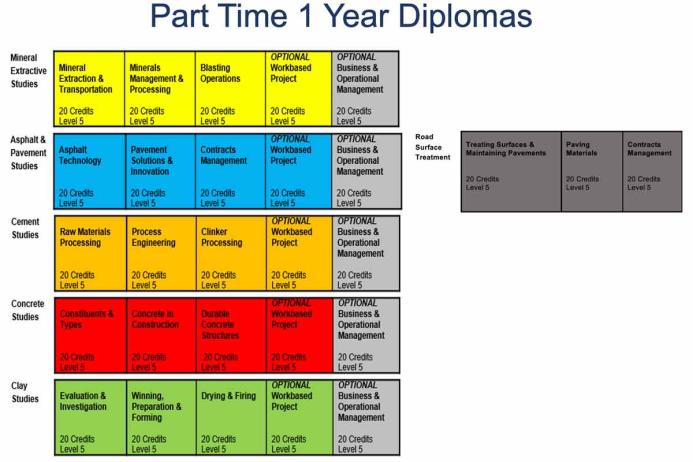
A rich history of success stories
‘Graduates of the Centre for Mineral Products consistently demonstrate excellence. The transferable skills they learn during their programmes are directly relevant to their career progression, often positioning themselves at a significant advantage,’ said John Austin, programmes lead, Mineral Extractives Technology.
Whether entering the industry or progressing within it, alumni have gone on to take roles such as:
Operations managers
Sustainability consultants
Technical specialists in asphalt, concrete, and cement
Senior site managers
A variety of other senior roles.
Learners also consistently secure top industry awards. In 2023, Peter Triccas TMIQ, at the time deputy quarry manager at Aggregates Industries UK, received the Reginald W Coles Award after graduating with a 96% average. Mr Triccas credits C4MP and his employer for enabling his advancement from quarry operator to manager.
Almost 80% of the 2025 graduates on the BSc (Hons) Mineral Products Management programme achieved a First class or 2:1 degree, demonstrating both academic excellence and industry recognition.

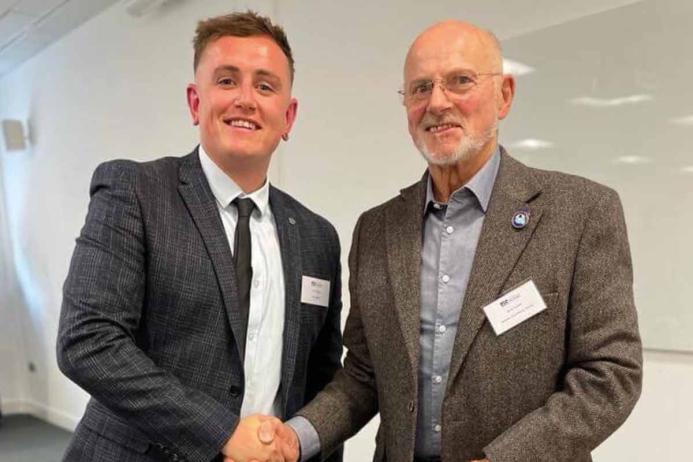
Transformational projects and industry savings
Robin Gillespie, at the time, a Heidelberg Materials UK operations manager, completed a top-graded, work-based project on electronic vs pyrotechnic blast delays. The study delivered potential annual savings of £750,000 to the business, highlighting direct business impact from academic work.
Nurturing tomorrow’s leaders
The Centre for Mineral Products delivers a coherent, flexible educational framework that allows learners to progress through multiple levels of education while actively contributing to their workplace. It stands as a key strategic partner in building the future workforce of the mineral products sector.
‘By offering a modular, flexible, and industry-driven suite of qualifications, the Centre for Mineral Products ensures that every learner, regardless of background or career stage, can access the right pathway to succeed in the evolving mineral products sector,’ said James Thorne, chief executive officer of the Institute of Quarrying and the Mineral Products Qualifications Council.
At a time when the mineral products industry faces challenges around sustainability, resource efficiency, and digital transformation, the Centre for Mineral Products stands out as a critical institution preparing the next generation of industry leaders. The programmes produce independent learners, capable of professionally managing their time and resources to identify issues, decide how to collect and analyse evidence, and reach reasoned evidence-based conclusions and subsequently present this information via various methods.
‘The development of programmes is the result of detailed collaboration with key organizations and consistent review of current employer needs. C4MP deliver best-practice outcomes,’ said Dr Helen Bailey, non-executive director and President of the Institute of Asphalt Technology.
Enrolment and application
Applications for enrolment are now open for all C4MP programmes, starting in September/October. For details, email: mineralproducts@derby.ac.uk; or: www.derby.ac.uk/mineral-products/
Subscribe to Quarry Management, the monthly journal for the mineral products industry, to read articles before they appear on Agg-Net.com


